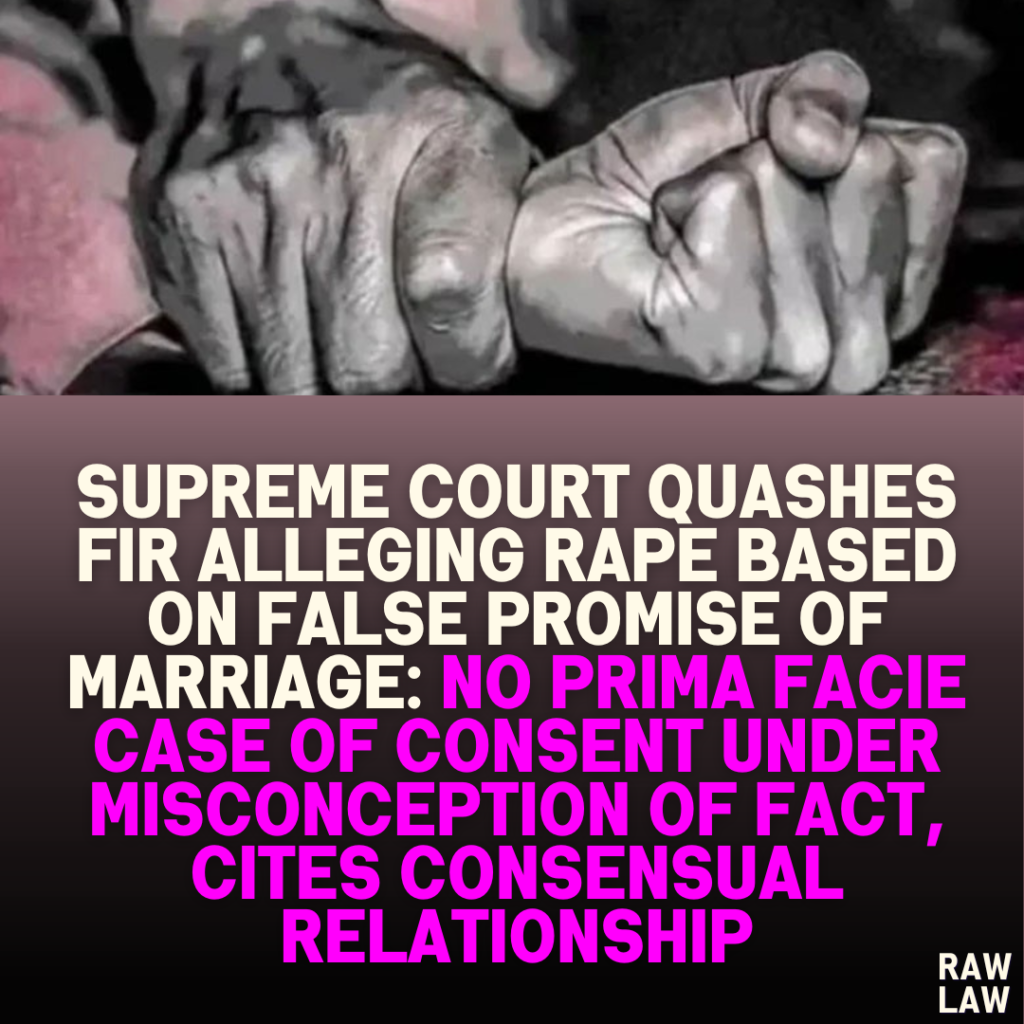Court’s Decision:
The Supreme Court allowed the appeal, quashing the FIR registered against the appellant under Section 376 IPC. The Court held that there was no prima facie case that the complainant gave consent for sexual relations under misconception of fact. The High Court’s refusal to quash the FIR was reversed, with the Court finding that the case involved a consensual relationship rather than rape under false promises of marriage.
Facts:
The complainant alleged that the appellant had promised to marry her and entered into a physical relationship with her under that false pretense. Over time, she became pregnant, and the appellant allegedly pressured her into abortions. The complainant also alleged that the appellant continued the relationship with her for years but eventually refused to marry her after securing a job.
The appellant sought the quashing of the FIR registered under Sections 376 and 313 of the Indian Penal Code, with the argument that the relationship was consensual and that there was no basis for the charges.
Issues:
- Whether the allegations of a false promise to marry and subsequent sexual relations constitute rape under Section 376 of the IPC.
- Whether the consent for the sexual relationship was obtained under a misconception of fact.
- Whether there was any abuse of the judicial process that justified quashing the FIR under Section 482 Cr.P.C.
Petitioner’s Arguments:
The appellant argued that the relationship between him and the complainant was consensual, and that they had lived as husband and wife for a considerable period. The allegations of rape under false promises of marriage were unfounded, as the complainant willingly continued the relationship over several years, including consenting to abortions. The delay in filing the FIR (after a period of five years) also raised questions about the veracity of the allegations.
Respondent’s Arguments:
The respondent (complainant) argued that the appellant had deceived her with false promises of marriage, leading her to consent to the sexual relationship. When the appellant eventually refused to marry her, it constituted a breach of trust, and hence, rape under the law.
Analysis of the Law:
The Court analyzed the provisions of Section 375 IPC, which defines rape, and examined whether the appellant’s actions amounted to obtaining consent under a false promise of marriage. The Court also referred to previous judgments, including the landmark case of State of Haryana v. Bhajan Lal, which laid down conditions for quashing criminal proceedings under Section 482 Cr.P.C.
Precedent Analysis:
The Court referred to the decision in Shivashankar v. State of Karnataka, which dealt with false promises of marriage, holding that long-term consensual relationships could not be retrospectively interpreted as rape simply because the relationship eventually broke down. In the case at hand, the Court found similarities with earlier cases, where relationships continued for extended periods and did not fall under the ambit of rape under Section 376.
Court’s Reasoning:
The Supreme Court found that the complainant and appellant had lived together for an extended period, during which the complainant referred to the appellant as her husband. The Court highlighted the significant delay in filing the FIR, the consensual nature of their relationship, and the complainant’s own actions, such as staying with the appellant in hotels. These factors led the Court to conclude that there was no evidence to support the allegation that the complainant had been misled into the relationship under a false promise of marriage.
Moreover, the investigation into the Section 313 IPC charge of abortion was completed, and the investigating officer found no evidence to substantiate the allegation.
Conclusion:
The Supreme Court quashed the FIR and the related criminal proceedings. It ruled that there was no prima facie case to proceed against the appellant under Section 376 IPC, as the relationship between the parties appeared to be consensual rather than a case of deception.
Implications:
This judgment reaffirms that long-term relationships, where parties voluntarily engage in physical relations, cannot be classified as rape merely because one party later refuses to marry the other. The case also underscores the importance of timely filing of complaints and the need for clear evidence when making serious allegations like rape.



